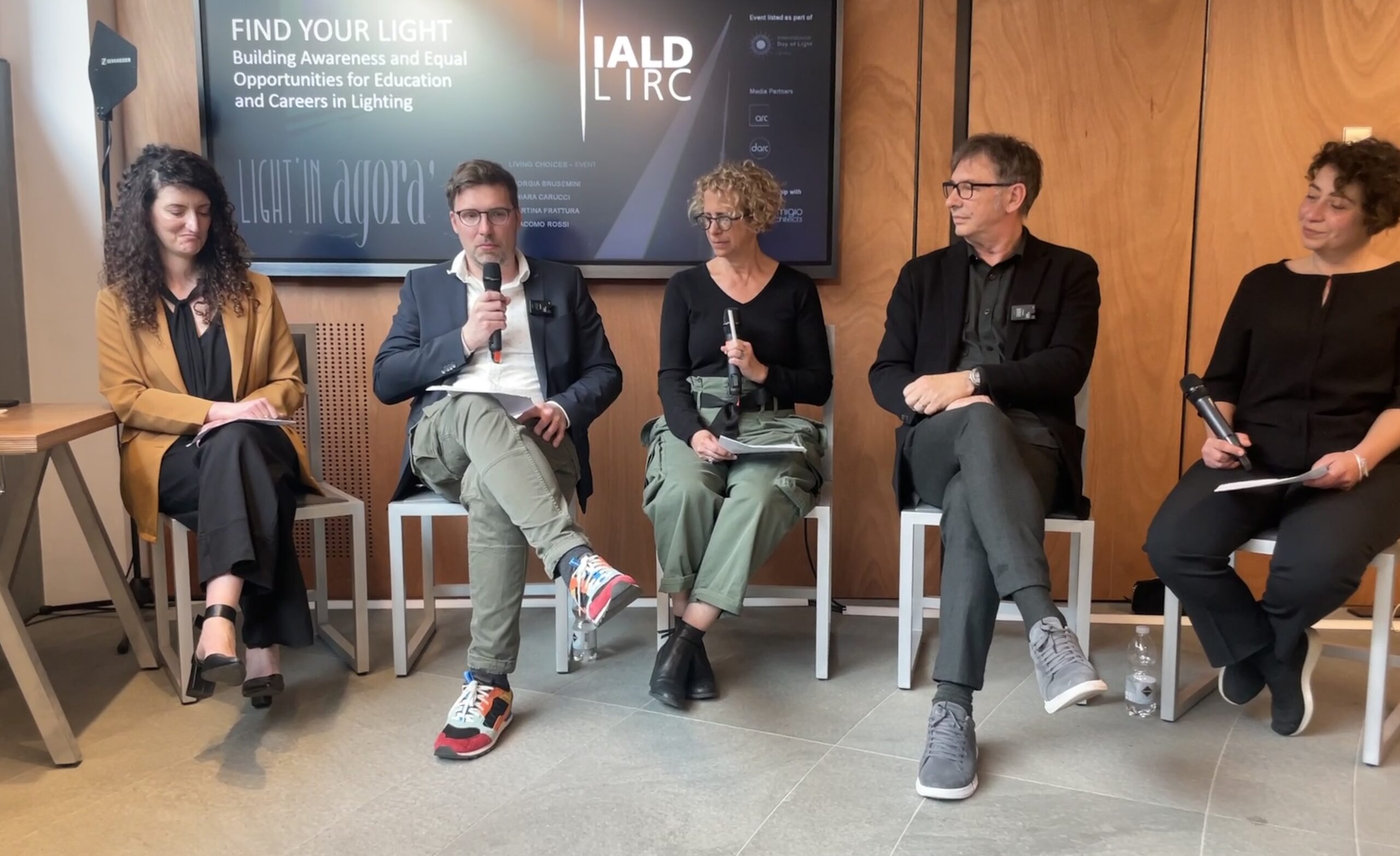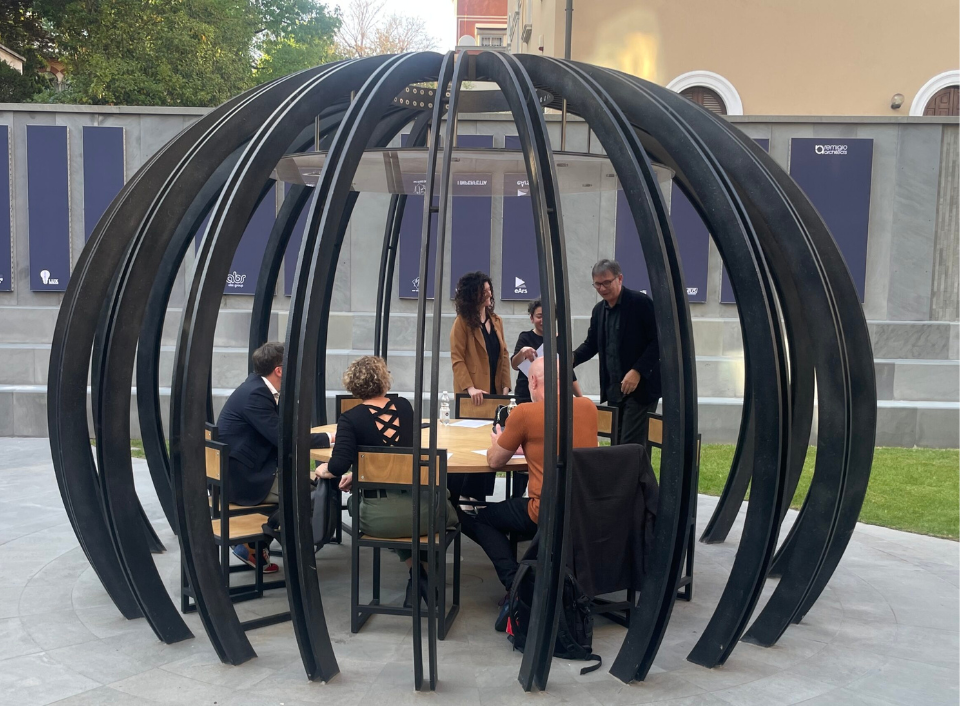A recent panel discussion held at the Light in Agora in Milan, Italy, on the topic of “Building Awareness and Equal Opportunities for Education and Careers in Lighting”, brought together lighting professionals from around the world to discuss the importance of lighting education and its current status in their respective countries. The panel was moderated by Martina Frattura and Chiara Carucci of the LIRC Steering Committee and featured Andrea Hartranft, FIALD, President-Elect of the IALD from the US; Dean Skira, IALD from Croatia; Paul Ehlert, IALD from Switzerland; and Surbhi Jindal, Associate IALD from India.
The discussion kicked off with Alexis Armaldi, co-chair for the LIRC steering committee, explaining the LIRC’s role within the IALD. Martina Frattura then spoke about the importance of inclusivity in the industry and the need to support and celebrate the professionals that IALD represents.

Paul Ehlert discusses the importance of reaching out to architects and engineers.
Andrea Hartranft emphasized the importance of lighting education for the sustainability of the profession. She noted that access to lighting education is essential for the industry’s future, as it allows for the training of new professionals in the next generation. Andrea also highlighted the need for awareness about lighting design as a profession and the importance of education in promoting inclusivity and diversity within the industry.
Surbhi Jindal spoke about the current status of lighting education in India, noting that while the country has a high reputation for education, it has taken a back seat in the last few years. She pointed out that with a population of 1.4 billion people and a focus on building infrastructure, there is high potential for lighting designers and educators in the country.
Paul Ehlert discussed the status of lighting education in Switzerland, noting that there is one program that offers basic lighting education and planning, as well as industry specialists. He emphasized the importance of sustainability and energy-saving in lighting design and says that lighting education should be an integral part of architecture training.
Dean Skira spoke about the general lack of lighting courses in Croatia. He also mentioned that he lectures architecture and interior design students to provide a different perspective on lighting.
Overall, the panelists agreed that access to lighting education is essential for the future of the industry and the promotion of inclusivity and diversity within it. They also highlighted the need for more programs and initiatives that focus on lighting education and the importance of integrating lighting into other areas of education, such as architecture, interior design, and engineering.
Dean teased about a new initiative that will be revealed at Enlighten Europe in Berlin.
During the panel discussion on building awareness and equal opportunities for education and careers in lighting, Chiara presented two workshop initiatives. The first workshop, Project Candle, is a four-day overnight camp in subsidized apartments for high school students, with a focus on learning about lighting through hands-on experiences. The workshop includes visual panels or light labs where students can try their hands at interior design and exterior lighting installations. Scholarships are available to ensure accessibility for all students. Interested individuals can register at projectcandle.org.
The second workshop initiative presented was Lighting in Alingsas (LIA) which involves leaders from around the world leading groups of students to create outdoor lighting installations in Alingsas, Sweden. Each workshop head is selected through an application process and leads a group for a week. Panelists Andrea Hartranft, Paul Ehlert, and Chiara Carucci have all served as workshop heads.
Paul Ehlert shared that he worked with one of the LIA founders from Stockholm over 20 years ago. The initiative serves as an opportunity for students and professionals to come together and create inspiring lighting installations, pushing the boundaries of what is possible in the field.
The discussion continued with the panelists sharing their thoughts on the challenges and opportunities in the field of lighting design. Dean mentioned the difficulty in explaining what human-centric lighting is to people outside the profession saying, “We actually don’t have words, linguistic facts, that we can use to explain to the people who don’t speak the language.” He emphasized the importance of starting with education at a young age, stating that “If you don’t start learning about the basics then you will not understand.”
Andrea spoke about the need to focus on qualitative aspects rather than numerical measures of lighting design, as people respond more to how a space makes them feel. She stressed the importance of good communication skills, as lighting designers are not only artists and technicians but also salespeople who need to sell their ideas to clients. She also highlighted the role of mentors and the need to give back to the profession through education.
Surbhi shared the challenges in developing as a lighting designer in India, where lighting design is often a neglected subject in the architecture curriculum. She emphasized the need for more hands-on workshops for students and lighting professionals and for partnerships with organizations to push for local education.
Paul emphasized the importance of promoting the lighting design profession to other professionals in the industry, such as architects and interior designers, to increase understanding of the role of lighting designers in a project. He also encouraged more education and hands-on workshops for students and professionals.
Dean suggested that the profession needs to be decentralized and spread in different ways, as the demand for lighting is often simply about providing enough quantity to see. He stressed the need for recognition of the profession and for more pride among lighting designers. He stated that “we’re the ambassadors” for quality lighting and encouraged giving back to the profession.
Throughout the discussion, the panelists highlighted the importance of education, communication, and collaboration to improve the access and recognition of the lighting design profession. Dean summed up the complexity of the profession, echoing a few things Andrea said earlier. “Look at us. You have to be architect, you have to be an artist, you have to be a businessman, and you have to be salesman. You have to be a very complex person to do this so how can anyone be born with all of these skills. It’s great isn’t it!”
The panelists all agreed that we have to find a way to talk to each other less and talk to others outside of our industry. I could not agree more.



